Analyzing Chung's Mental Health: A Case Study with DSM-V and Recovery
VerifiedAdded on 2024/07/01
|7
|2305
|193
Case Study
AI Summary
This case study provides an analysis of Chung's mental health, identifying his emotional and psychological challenges based on Keyes' components of mental well-being and the DSM-V model. Chung exhibits symptoms indicative of anxiety, panic attacks, and suicidal thoughts, stemming from work-related stress and feelings of inadequacy as a husband and father. The stress-vulnerability model is applied to understand the contributing factors, including the pressures of a demanding job and new parental responsibilities. The recovery model for mental health is then discussed, emphasizing respect, empowerment, and hope as key elements in Chung's potential recovery, with suggestions for practical steps such as professional support and peer interaction. This document is available on Desklib, a platform offering a range of study resources for students.
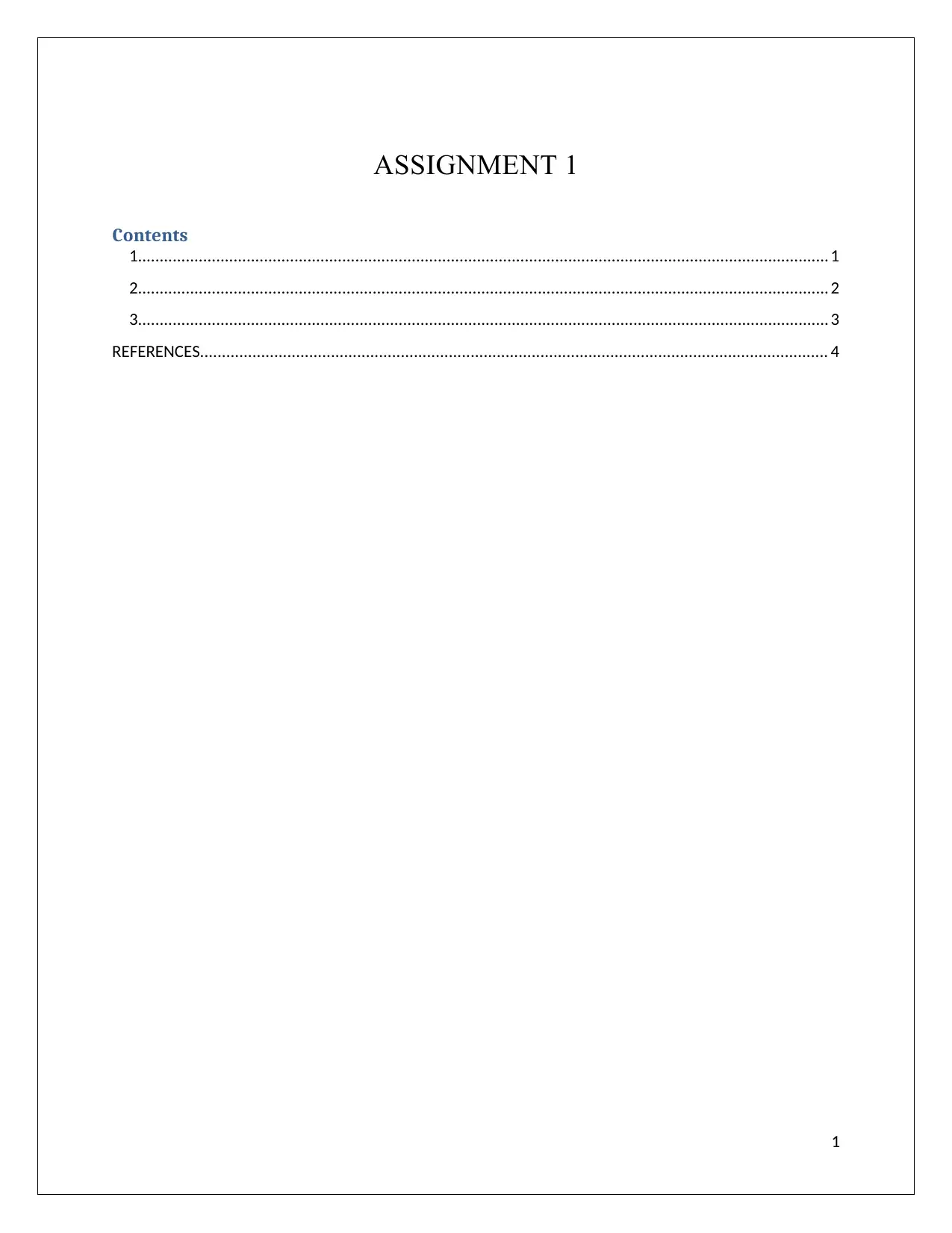
ASSIGNMENT 1
Contents
1............................................................................................................................................................... 1
2............................................................................................................................................................... 2
3............................................................................................................................................................... 3
REFERENCES................................................................................................................................................ 4
1
Contents
1............................................................................................................................................................... 1
2............................................................................................................................................................... 2
3............................................................................................................................................................... 3
REFERENCES................................................................................................................................................ 4
1
Paraphrase This Document
Need a fresh take? Get an instant paraphrase of this document with our AI Paraphraser
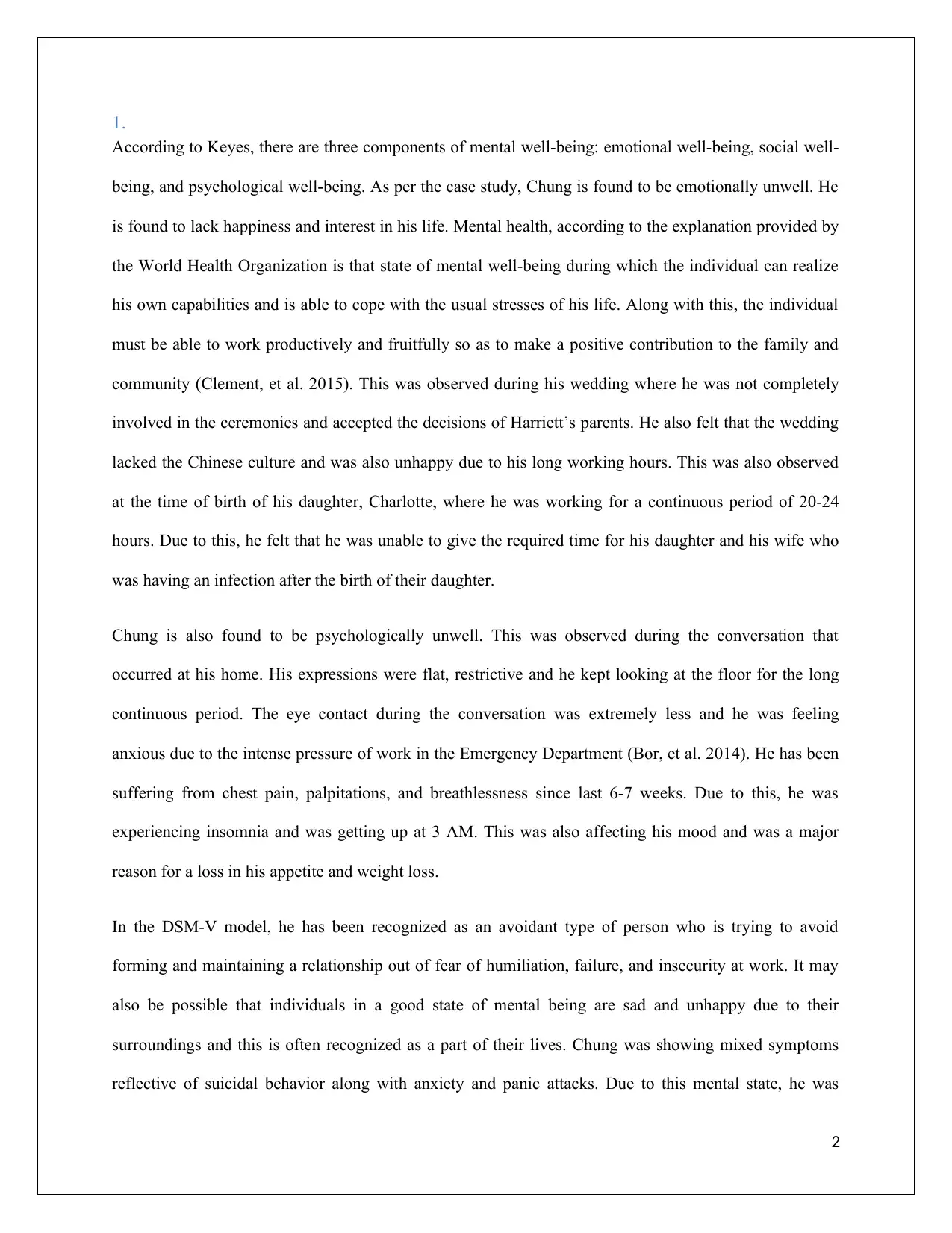
1.
According to Keyes, there are three components of mental well-being: emotional well-being, social well-
being, and psychological well-being. As per the case study, Chung is found to be emotionally unwell. He
is found to lack happiness and interest in his life. Mental health, according to the explanation provided by
the World Health Organization is that state of mental well-being during which the individual can realize
his own capabilities and is able to cope with the usual stresses of his life. Along with this, the individual
must be able to work productively and fruitfully so as to make a positive contribution to the family and
community (Clement, et al. 2015). This was observed during his wedding where he was not completely
involved in the ceremonies and accepted the decisions of Harriett’s parents. He also felt that the wedding
lacked the Chinese culture and was also unhappy due to his long working hours. This was also observed
at the time of birth of his daughter, Charlotte, where he was working for a continuous period of 20-24
hours. Due to this, he felt that he was unable to give the required time for his daughter and his wife who
was having an infection after the birth of their daughter.
Chung is also found to be psychologically unwell. This was observed during the conversation that
occurred at his home. His expressions were flat, restrictive and he kept looking at the floor for the long
continuous period. The eye contact during the conversation was extremely less and he was feeling
anxious due to the intense pressure of work in the Emergency Department (Bor, et al. 2014). He has been
suffering from chest pain, palpitations, and breathlessness since last 6-7 weeks. Due to this, he was
experiencing insomnia and was getting up at 3 AM. This was also affecting his mood and was a major
reason for a loss in his appetite and weight loss.
In the DSM-V model, he has been recognized as an avoidant type of person who is trying to avoid
forming and maintaining a relationship out of fear of humiliation, failure, and insecurity at work. It may
also be possible that individuals in a good state of mental being are sad and unhappy due to their
surroundings and this is often recognized as a part of their lives. Chung was showing mixed symptoms
reflective of suicidal behavior along with anxiety and panic attacks. Due to this mental state, he was
2
According to Keyes, there are three components of mental well-being: emotional well-being, social well-
being, and psychological well-being. As per the case study, Chung is found to be emotionally unwell. He
is found to lack happiness and interest in his life. Mental health, according to the explanation provided by
the World Health Organization is that state of mental well-being during which the individual can realize
his own capabilities and is able to cope with the usual stresses of his life. Along with this, the individual
must be able to work productively and fruitfully so as to make a positive contribution to the family and
community (Clement, et al. 2015). This was observed during his wedding where he was not completely
involved in the ceremonies and accepted the decisions of Harriett’s parents. He also felt that the wedding
lacked the Chinese culture and was also unhappy due to his long working hours. This was also observed
at the time of birth of his daughter, Charlotte, where he was working for a continuous period of 20-24
hours. Due to this, he felt that he was unable to give the required time for his daughter and his wife who
was having an infection after the birth of their daughter.
Chung is also found to be psychologically unwell. This was observed during the conversation that
occurred at his home. His expressions were flat, restrictive and he kept looking at the floor for the long
continuous period. The eye contact during the conversation was extremely less and he was feeling
anxious due to the intense pressure of work in the Emergency Department (Bor, et al. 2014). He has been
suffering from chest pain, palpitations, and breathlessness since last 6-7 weeks. Due to this, he was
experiencing insomnia and was getting up at 3 AM. This was also affecting his mood and was a major
reason for a loss in his appetite and weight loss.
In the DSM-V model, he has been recognized as an avoidant type of person who is trying to avoid
forming and maintaining a relationship out of fear of humiliation, failure, and insecurity at work. It may
also be possible that individuals in a good state of mental being are sad and unhappy due to their
surroundings and this is often recognized as a part of their lives. Chung was showing mixed symptoms
reflective of suicidal behavior along with anxiety and panic attacks. Due to this mental state, he was
2
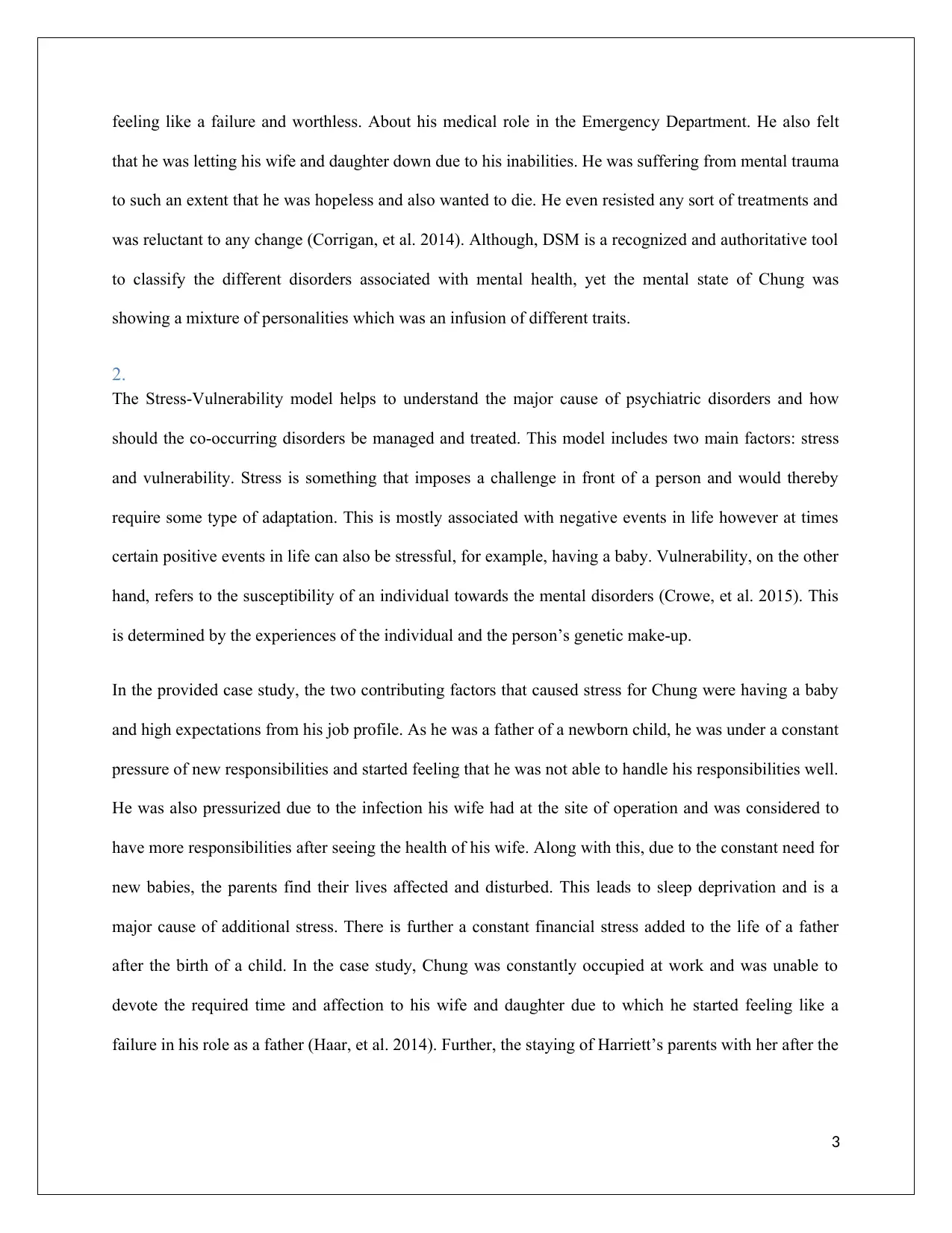
feeling like a failure and worthless. About his medical role in the Emergency Department. He also felt
that he was letting his wife and daughter down due to his inabilities. He was suffering from mental trauma
to such an extent that he was hopeless and also wanted to die. He even resisted any sort of treatments and
was reluctant to any change (Corrigan, et al. 2014). Although, DSM is a recognized and authoritative tool
to classify the different disorders associated with mental health, yet the mental state of Chung was
showing a mixture of personalities which was an infusion of different traits.
2.
The Stress-Vulnerability model helps to understand the major cause of psychiatric disorders and how
should the co-occurring disorders be managed and treated. This model includes two main factors: stress
and vulnerability. Stress is something that imposes a challenge in front of a person and would thereby
require some type of adaptation. This is mostly associated with negative events in life however at times
certain positive events in life can also be stressful, for example, having a baby. Vulnerability, on the other
hand, refers to the susceptibility of an individual towards the mental disorders (Crowe, et al. 2015). This
is determined by the experiences of the individual and the person’s genetic make-up.
In the provided case study, the two contributing factors that caused stress for Chung were having a baby
and high expectations from his job profile. As he was a father of a newborn child, he was under a constant
pressure of new responsibilities and started feeling that he was not able to handle his responsibilities well.
He was also pressurized due to the infection his wife had at the site of operation and was considered to
have more responsibilities after seeing the health of his wife. Along with this, due to the constant need for
new babies, the parents find their lives affected and disturbed. This leads to sleep deprivation and is a
major cause of additional stress. There is further a constant financial stress added to the life of a father
after the birth of a child. In the case study, Chung was constantly occupied at work and was unable to
devote the required time and affection to his wife and daughter due to which he started feeling like a
failure in his role as a father (Haar, et al. 2014). Further, the staying of Harriett’s parents with her after the
3
that he was letting his wife and daughter down due to his inabilities. He was suffering from mental trauma
to such an extent that he was hopeless and also wanted to die. He even resisted any sort of treatments and
was reluctant to any change (Corrigan, et al. 2014). Although, DSM is a recognized and authoritative tool
to classify the different disorders associated with mental health, yet the mental state of Chung was
showing a mixture of personalities which was an infusion of different traits.
2.
The Stress-Vulnerability model helps to understand the major cause of psychiatric disorders and how
should the co-occurring disorders be managed and treated. This model includes two main factors: stress
and vulnerability. Stress is something that imposes a challenge in front of a person and would thereby
require some type of adaptation. This is mostly associated with negative events in life however at times
certain positive events in life can also be stressful, for example, having a baby. Vulnerability, on the other
hand, refers to the susceptibility of an individual towards the mental disorders (Crowe, et al. 2015). This
is determined by the experiences of the individual and the person’s genetic make-up.
In the provided case study, the two contributing factors that caused stress for Chung were having a baby
and high expectations from his job profile. As he was a father of a newborn child, he was under a constant
pressure of new responsibilities and started feeling that he was not able to handle his responsibilities well.
He was also pressurized due to the infection his wife had at the site of operation and was considered to
have more responsibilities after seeing the health of his wife. Along with this, due to the constant need for
new babies, the parents find their lives affected and disturbed. This leads to sleep deprivation and is a
major cause of additional stress. There is further a constant financial stress added to the life of a father
after the birth of a child. In the case study, Chung was constantly occupied at work and was unable to
devote the required time and affection to his wife and daughter due to which he started feeling like a
failure in his role as a father (Haar, et al. 2014). Further, the staying of Harriett’s parents with her after the
3
⊘ This is a preview!⊘
Do you want full access?
Subscribe today to unlock all pages.

Trusted by 1+ million students worldwide
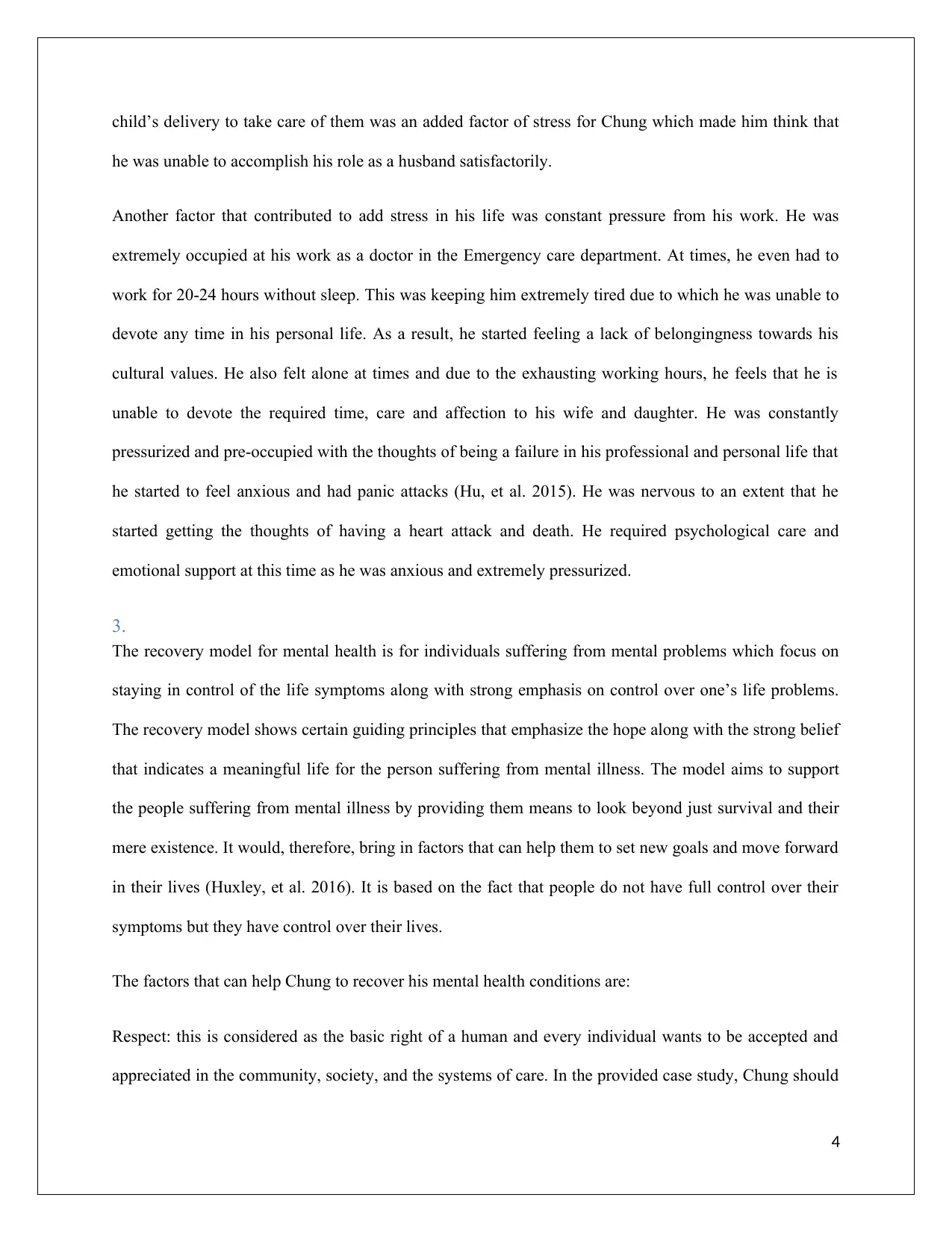
child’s delivery to take care of them was an added factor of stress for Chung which made him think that
he was unable to accomplish his role as a husband satisfactorily.
Another factor that contributed to add stress in his life was constant pressure from his work. He was
extremely occupied at his work as a doctor in the Emergency care department. At times, he even had to
work for 20-24 hours without sleep. This was keeping him extremely tired due to which he was unable to
devote any time in his personal life. As a result, he started feeling a lack of belongingness towards his
cultural values. He also felt alone at times and due to the exhausting working hours, he feels that he is
unable to devote the required time, care and affection to his wife and daughter. He was constantly
pressurized and pre-occupied with the thoughts of being a failure in his professional and personal life that
he started to feel anxious and had panic attacks (Hu, et al. 2015). He was nervous to an extent that he
started getting the thoughts of having a heart attack and death. He required psychological care and
emotional support at this time as he was anxious and extremely pressurized.
3.
The recovery model for mental health is for individuals suffering from mental problems which focus on
staying in control of the life symptoms along with strong emphasis on control over one’s life problems.
The recovery model shows certain guiding principles that emphasize the hope along with the strong belief
that indicates a meaningful life for the person suffering from mental illness. The model aims to support
the people suffering from mental illness by providing them means to look beyond just survival and their
mere existence. It would, therefore, bring in factors that can help them to set new goals and move forward
in their lives (Huxley, et al. 2016). It is based on the fact that people do not have full control over their
symptoms but they have control over their lives.
The factors that can help Chung to recover his mental health conditions are:
Respect: this is considered as the basic right of a human and every individual wants to be accepted and
appreciated in the community, society, and the systems of care. In the provided case study, Chung should
4
he was unable to accomplish his role as a husband satisfactorily.
Another factor that contributed to add stress in his life was constant pressure from his work. He was
extremely occupied at his work as a doctor in the Emergency care department. At times, he even had to
work for 20-24 hours without sleep. This was keeping him extremely tired due to which he was unable to
devote any time in his personal life. As a result, he started feeling a lack of belongingness towards his
cultural values. He also felt alone at times and due to the exhausting working hours, he feels that he is
unable to devote the required time, care and affection to his wife and daughter. He was constantly
pressurized and pre-occupied with the thoughts of being a failure in his professional and personal life that
he started to feel anxious and had panic attacks (Hu, et al. 2015). He was nervous to an extent that he
started getting the thoughts of having a heart attack and death. He required psychological care and
emotional support at this time as he was anxious and extremely pressurized.
3.
The recovery model for mental health is for individuals suffering from mental problems which focus on
staying in control of the life symptoms along with strong emphasis on control over one’s life problems.
The recovery model shows certain guiding principles that emphasize the hope along with the strong belief
that indicates a meaningful life for the person suffering from mental illness. The model aims to support
the people suffering from mental illness by providing them means to look beyond just survival and their
mere existence. It would, therefore, bring in factors that can help them to set new goals and move forward
in their lives (Huxley, et al. 2016). It is based on the fact that people do not have full control over their
symptoms but they have control over their lives.
The factors that can help Chung to recover his mental health conditions are:
Respect: this is considered as the basic right of a human and every individual wants to be accepted and
appreciated in the community, society, and the systems of care. In the provided case study, Chung should
4
Paraphrase This Document
Need a fresh take? Get an instant paraphrase of this document with our AI Paraphraser
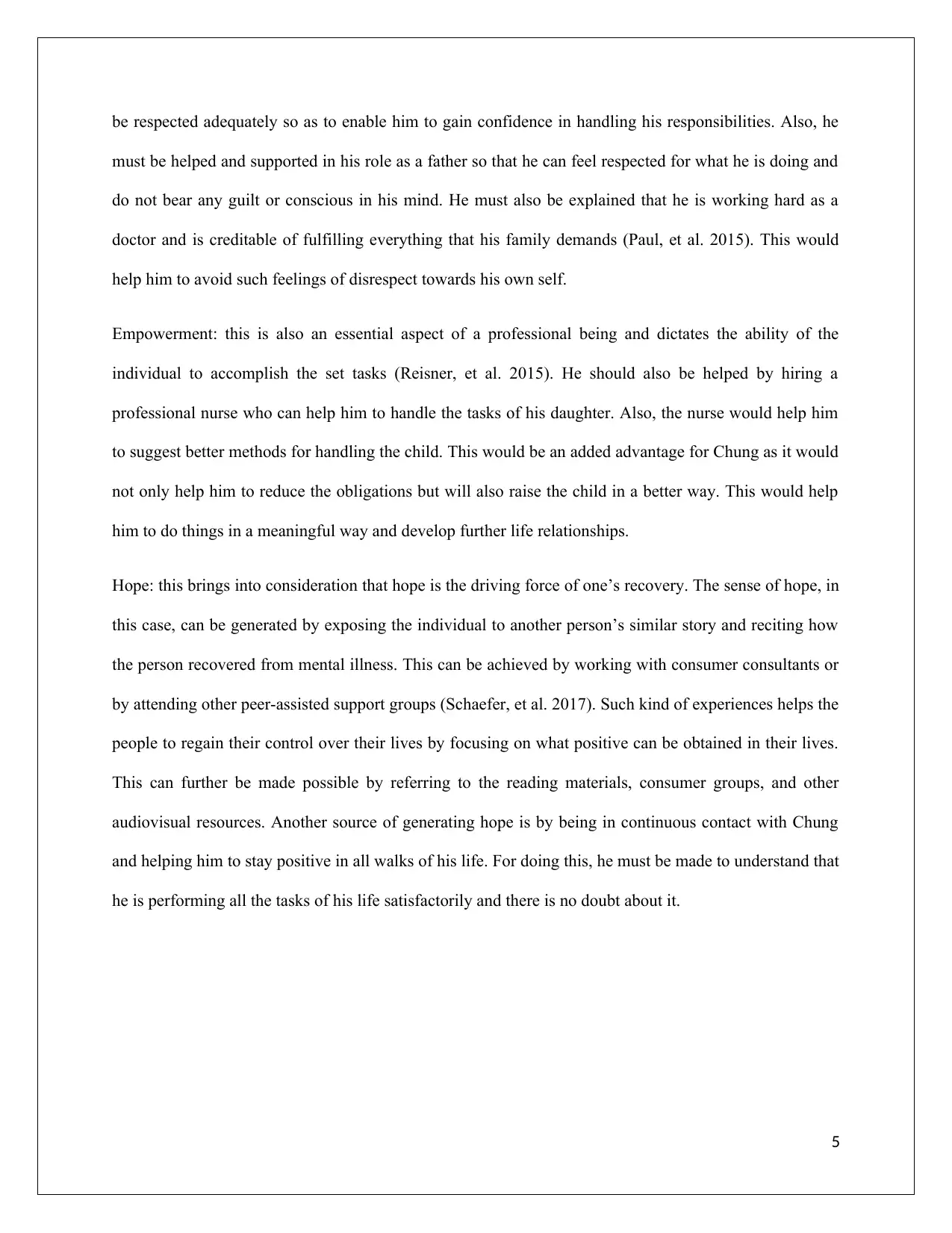
be respected adequately so as to enable him to gain confidence in handling his responsibilities. Also, he
must be helped and supported in his role as a father so that he can feel respected for what he is doing and
do not bear any guilt or conscious in his mind. He must also be explained that he is working hard as a
doctor and is creditable of fulfilling everything that his family demands (Paul, et al. 2015). This would
help him to avoid such feelings of disrespect towards his own self.
Empowerment: this is also an essential aspect of a professional being and dictates the ability of the
individual to accomplish the set tasks (Reisner, et al. 2015). He should also be helped by hiring a
professional nurse who can help him to handle the tasks of his daughter. Also, the nurse would help him
to suggest better methods for handling the child. This would be an added advantage for Chung as it would
not only help him to reduce the obligations but will also raise the child in a better way. This would help
him to do things in a meaningful way and develop further life relationships.
Hope: this brings into consideration that hope is the driving force of one’s recovery. The sense of hope, in
this case, can be generated by exposing the individual to another person’s similar story and reciting how
the person recovered from mental illness. This can be achieved by working with consumer consultants or
by attending other peer-assisted support groups (Schaefer, et al. 2017). Such kind of experiences helps the
people to regain their control over their lives by focusing on what positive can be obtained in their lives.
This can further be made possible by referring to the reading materials, consumer groups, and other
audiovisual resources. Another source of generating hope is by being in continuous contact with Chung
and helping him to stay positive in all walks of his life. For doing this, he must be made to understand that
he is performing all the tasks of his life satisfactorily and there is no doubt about it.
5
must be helped and supported in his role as a father so that he can feel respected for what he is doing and
do not bear any guilt or conscious in his mind. He must also be explained that he is working hard as a
doctor and is creditable of fulfilling everything that his family demands (Paul, et al. 2015). This would
help him to avoid such feelings of disrespect towards his own self.
Empowerment: this is also an essential aspect of a professional being and dictates the ability of the
individual to accomplish the set tasks (Reisner, et al. 2015). He should also be helped by hiring a
professional nurse who can help him to handle the tasks of his daughter. Also, the nurse would help him
to suggest better methods for handling the child. This would be an added advantage for Chung as it would
not only help him to reduce the obligations but will also raise the child in a better way. This would help
him to do things in a meaningful way and develop further life relationships.
Hope: this brings into consideration that hope is the driving force of one’s recovery. The sense of hope, in
this case, can be generated by exposing the individual to another person’s similar story and reciting how
the person recovered from mental illness. This can be achieved by working with consumer consultants or
by attending other peer-assisted support groups (Schaefer, et al. 2017). Such kind of experiences helps the
people to regain their control over their lives by focusing on what positive can be obtained in their lives.
This can further be made possible by referring to the reading materials, consumer groups, and other
audiovisual resources. Another source of generating hope is by being in continuous contact with Chung
and helping him to stay positive in all walks of his life. For doing this, he must be made to understand that
he is performing all the tasks of his life satisfactorily and there is no doubt about it.
5
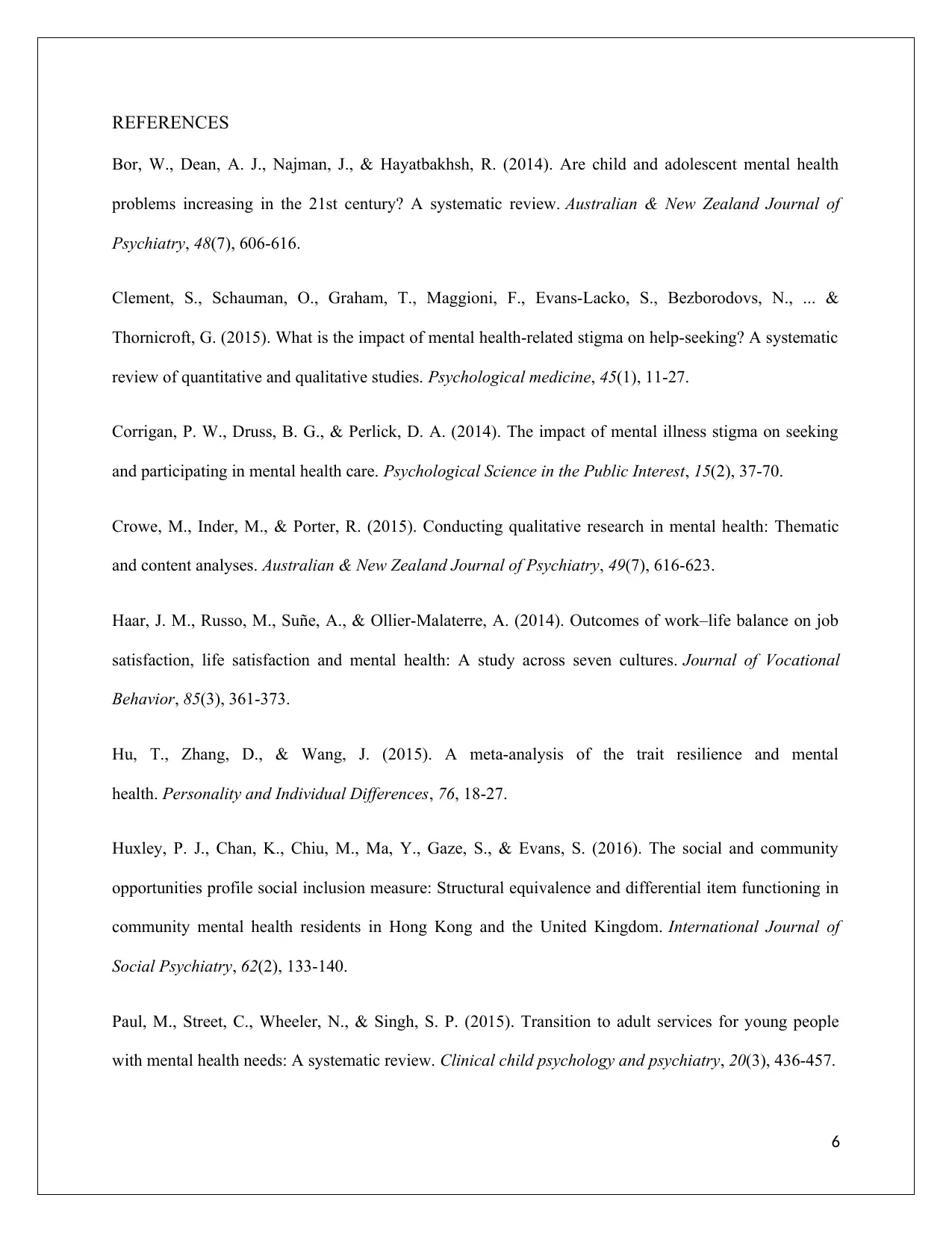
REFERENCES
Bor, W., Dean, A. J., Najman, J., & Hayatbakhsh, R. (2014). Are child and adolescent mental health
problems increasing in the 21st century? A systematic review. Australian & New Zealand Journal of
Psychiatry, 48(7), 606-616.
Clement, S., Schauman, O., Graham, T., Maggioni, F., Evans-Lacko, S., Bezborodovs, N., ... &
Thornicroft, G. (2015). What is the impact of mental health-related stigma on help-seeking? A systematic
review of quantitative and qualitative studies. Psychological medicine, 45(1), 11-27.
Corrigan, P. W., Druss, B. G., & Perlick, D. A. (2014). The impact of mental illness stigma on seeking
and participating in mental health care. Psychological Science in the Public Interest, 15(2), 37-70.
Crowe, M., Inder, M., & Porter, R. (2015). Conducting qualitative research in mental health: Thematic
and content analyses. Australian & New Zealand Journal of Psychiatry, 49(7), 616-623.
Haar, J. M., Russo, M., Suñe, A., & Ollier-Malaterre, A. (2014). Outcomes of work–life balance on job
satisfaction, life satisfaction and mental health: A study across seven cultures. Journal of Vocational
Behavior, 85(3), 361-373.
Hu, T., Zhang, D., & Wang, J. (2015). A meta-analysis of the trait resilience and mental
health. Personality and Individual Differences, 76, 18-27.
Huxley, P. J., Chan, K., Chiu, M., Ma, Y., Gaze, S., & Evans, S. (2016). The social and community
opportunities profile social inclusion measure: Structural equivalence and differential item functioning in
community mental health residents in Hong Kong and the United Kingdom. International Journal of
Social Psychiatry, 62(2), 133-140.
Paul, M., Street, C., Wheeler, N., & Singh, S. P. (2015). Transition to adult services for young people
with mental health needs: A systematic review. Clinical child psychology and psychiatry, 20(3), 436-457.
6
Bor, W., Dean, A. J., Najman, J., & Hayatbakhsh, R. (2014). Are child and adolescent mental health
problems increasing in the 21st century? A systematic review. Australian & New Zealand Journal of
Psychiatry, 48(7), 606-616.
Clement, S., Schauman, O., Graham, T., Maggioni, F., Evans-Lacko, S., Bezborodovs, N., ... &
Thornicroft, G. (2015). What is the impact of mental health-related stigma on help-seeking? A systematic
review of quantitative and qualitative studies. Psychological medicine, 45(1), 11-27.
Corrigan, P. W., Druss, B. G., & Perlick, D. A. (2014). The impact of mental illness stigma on seeking
and participating in mental health care. Psychological Science in the Public Interest, 15(2), 37-70.
Crowe, M., Inder, M., & Porter, R. (2015). Conducting qualitative research in mental health: Thematic
and content analyses. Australian & New Zealand Journal of Psychiatry, 49(7), 616-623.
Haar, J. M., Russo, M., Suñe, A., & Ollier-Malaterre, A. (2014). Outcomes of work–life balance on job
satisfaction, life satisfaction and mental health: A study across seven cultures. Journal of Vocational
Behavior, 85(3), 361-373.
Hu, T., Zhang, D., & Wang, J. (2015). A meta-analysis of the trait resilience and mental
health. Personality and Individual Differences, 76, 18-27.
Huxley, P. J., Chan, K., Chiu, M., Ma, Y., Gaze, S., & Evans, S. (2016). The social and community
opportunities profile social inclusion measure: Structural equivalence and differential item functioning in
community mental health residents in Hong Kong and the United Kingdom. International Journal of
Social Psychiatry, 62(2), 133-140.
Paul, M., Street, C., Wheeler, N., & Singh, S. P. (2015). Transition to adult services for young people
with mental health needs: A systematic review. Clinical child psychology and psychiatry, 20(3), 436-457.
6
⊘ This is a preview!⊘
Do you want full access?
Subscribe today to unlock all pages.

Trusted by 1+ million students worldwide
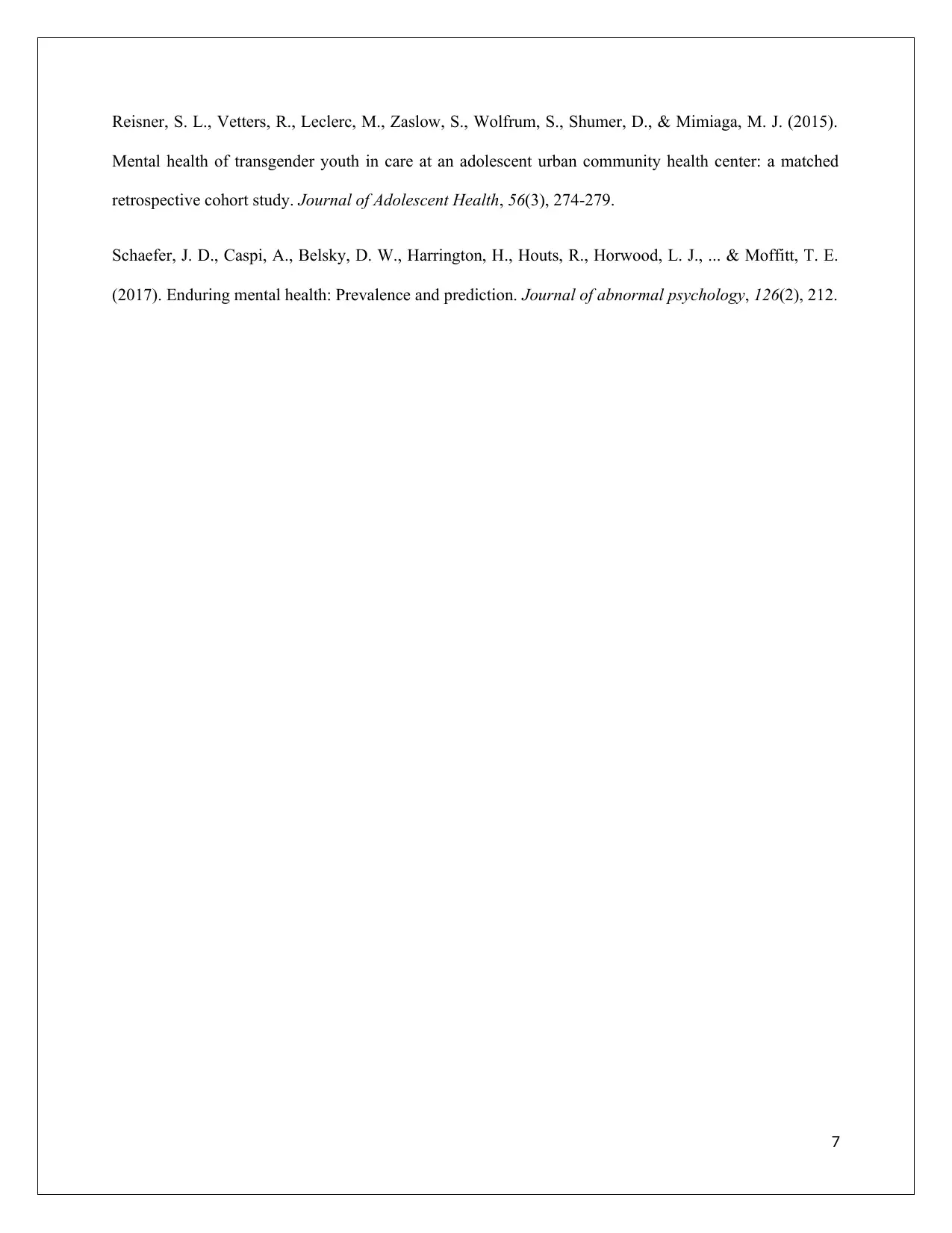
Reisner, S. L., Vetters, R., Leclerc, M., Zaslow, S., Wolfrum, S., Shumer, D., & Mimiaga, M. J. (2015).
Mental health of transgender youth in care at an adolescent urban community health center: a matched
retrospective cohort study. Journal of Adolescent Health, 56(3), 274-279.
Schaefer, J. D., Caspi, A., Belsky, D. W., Harrington, H., Houts, R., Horwood, L. J., ... & Moffitt, T. E.
(2017). Enduring mental health: Prevalence and prediction. Journal of abnormal psychology, 126(2), 212.
7
Mental health of transgender youth in care at an adolescent urban community health center: a matched
retrospective cohort study. Journal of Adolescent Health, 56(3), 274-279.
Schaefer, J. D., Caspi, A., Belsky, D. W., Harrington, H., Houts, R., Horwood, L. J., ... & Moffitt, T. E.
(2017). Enduring mental health: Prevalence and prediction. Journal of abnormal psychology, 126(2), 212.
7
1 out of 7
Related Documents
Your All-in-One AI-Powered Toolkit for Academic Success.
+13062052269
info@desklib.com
Available 24*7 on WhatsApp / Email
![[object Object]](/_next/static/media/star-bottom.7253800d.svg)
Unlock your academic potential
Copyright © 2020–2025 A2Z Services. All Rights Reserved. Developed and managed by ZUCOL.




